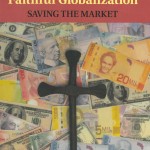I enjoyed celebrating Thanksgiving with my family. I’m thankful for the lives of my three daughters, for my husband; I’m thankful for my parents, my siblings, and my extended family through marriage. This season, I was especially thankful that my husband and I are able to provide for our family, to meet our children’s needs, and be able to see them thrive. Yet even as I am grateful for these things, I feel a sense of unease in thanking God for these things as good gifts.
Part of this stems from the fact that I hurt alongside with the poor when I celebrate Thanksgiving. Bryant Myers, in his book, Walking with the Poor (1999), writes:
Poverty is a result of relationships that do not work, that are not just, that are not for life, that are not harmonious or enjoyable. Poverty is the absence of shalom in all its meanings.

Social scientists often distinguish between absolute and relative poverty, because poverty is not just about material need. One of the curses of poverty is the broken relationships that it entails.
Since becoming a mother, I often think more about what poverty means for parents, and the pain of not being able to provide for one’s children. Sometimes when eating dinner with my pasta-loving children, I imagine what it would be like to have to tell them that I do not have food to feed them. I watch them play, and celebrate the fact that they can live a life of childhood free from real scarcity or worry. I rejoice in the fact that I have a job that gives me the time (and energy) to spend time just being and loving my children in person. But I do not take these realities for granted.
While prosperity gospel is not the prevalent paradigm within Christian churches in the United States, many of us (Christians) still see our material resources as a gift from God. And this is the belief I wrestled with this Thanksgiving. While I fully believe in the sovereignty of God to give to some and not to others, that’s not my dominant explanation of why I have and others do not. Many of the blessings I celebrate are linked to my social location. Recently, The Economist ran an article on inequality in the United States, noting that inequality is on the rise. But what they highlight as one of the central problems is that social mobility is declining, declaring that “Although the United States is seen as a world of opportunity, the reality may be different.” This argument ran under the subtitle,
A long ladder is fine, but it must have rungs
Unfortunately, there are many people who want to climb the ladder; those who want to support their families. While I will continue to be thankful for the ability to give to my children, I believe simply being thankful is not only not enough. It’s not the full story. It fails to see the way that our gifts are often not things that are ‘given by God,’ but rather are the result of a broken and unequal system. For me, that means needing to acknowledge that I benefit from a global economic system in a way that many do not, and to ask God what it means to be faithful with those resources that I have. As I think about what that means for my own life, I keep coming back to three things:
- To make a conscious choice not to exploit others, either indirectly or directly. This requires me to more actively ask questions and investigate how I am able to achieve the lifestyle (and the “blessings” I have). For some, this entails questions about ethical and sustainable consumerism.
- To be committed to helping families thrive, and to help parents be able to support their own children. I recognize that most parents want the best for the children, and being a good parent is largely (although not solely) about having certain resources.
- To remember why I became a sociologist. One of my central research interests deals with the way relationships are structured by changes in the international political economy. While I often investigate macro-level concerns, it is because of the pupusa vendor in El Salvador trying to feed her children that I became a sociologist.
I am thankful to God, the giver of life. I am thankful that He loves all His children. And I am thankful for the opportunity to try and be a part of pursuing His heart for the world. Of course, I will not deny that I am still thankful for my family and our resources, but even more thankful that God desires for all families to thrive.











